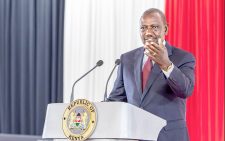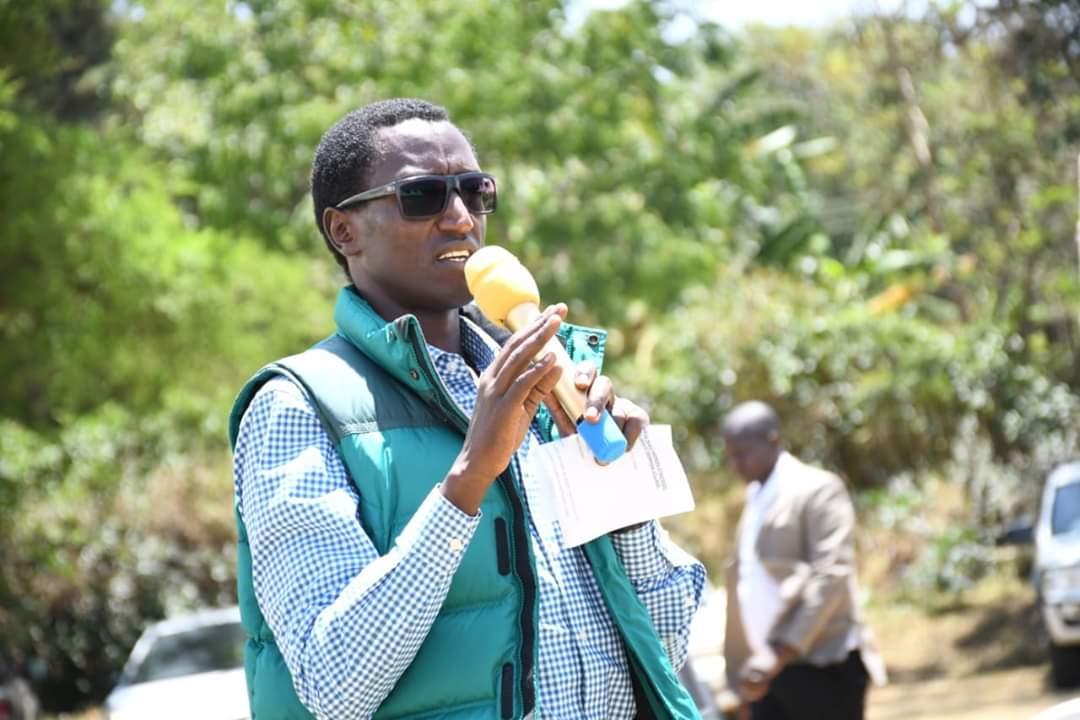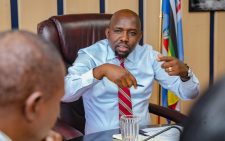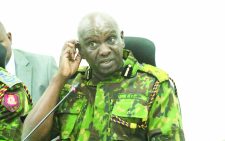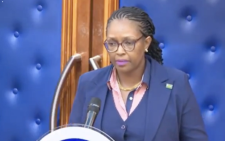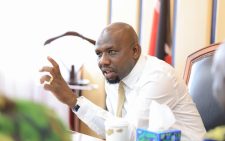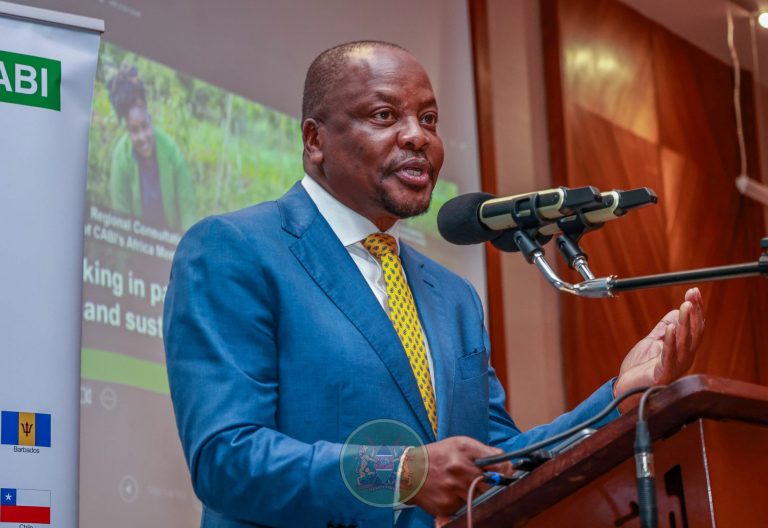Muturi exposes Ruto’s one-man leadership style, iron grip on power

Kenya’s political climate under President William Ruto has drawn increasing scrutiny, with critics alleging a shift toward authoritarianism.
Opposition leaders, civil society groups, and former government officials have raised concerns about the erosion of democratic institutions, human rights abuses, and the concentration of power.
Former allies of the have increasingly criticised his leadership style, describing it as a “one-man show” that undermines collective decision-making and alienates key government officials.
In an exclusive interview with the PD Wikendi, former Attorney General and Public Service Cabinet Secretary Justin B. Muturi, describes the President as one who enjoys running everything, be it Cabinet meetings or any caucus he has convened to deliberate on an issue.
Muturi who was recently sacked by President Ruto after a three month spat between the two over abductions, claims that the Head of State runs the government with an iron grip, directly controlling operations in every ministry and State corporations.
“He is one person who comes to any meeting with a know-it-all attitude and ensures that he turns the caucus into a monologue where he lectures and issues directives,” Muturi told the PD Wikendi.
While President Ruto has projected the image of a hands-on, no-nonsense leader determined to implement his vision for Kenya, Muturi says behind the scenes, his administration is marked by a firm, centralised style of governance that leaves little room for dissent or independent ministerial power.
Muturi, who served as the National Assembly Speaker during the ten-year reign of President Uhuru Kenyatta, describes Dr Ruto’s leadership as one of control — even domination — over key ministries and all decisions.
Muturi says his former boss has a penchant for making off-the-cuff policy pronouncements with significant implications, leaving little room for independent decision-making by government officials.
Public reprimands
“Unlike his predecessor Uhuru Kenyatta, who often delegated and allowed CSs to champion flagship projects, Ruto frequently appears to pull the strings himself. Policy announcements that traditionally would come from ministries are now made directly from the State House, often during political rallies or press briefings led by Ruto himself. This gives him personal ownership of successes — and leverage to assign blame for failures,” Muturi says.
From Energy to Agriculture, Muturi says Dr Ruto’s direct influence is unmistakable. Cabinet Secretaries (CSs), Principal Secretaries (PSs), and even State corporation CEOs reportedly operate under constant pressure to align with Dr Ruto’s political and economic directives.
Any deviation — perceived or real — can trigger swift consequences, including public reprimands or one being summoned for lengthy lectures at the State House.
“In particular, the president runs the Ministry of Agriculture like his personal property, pulling all the strings there,” says Muturi.
Muturi’s claims appear to collaborate with assertions by immediate former Deputy President Rigathi Gachagua, who in a December 2024 interview on Inooro TV’s Kiririmbi show, accused President Ruto of sidelining Cabinet Secretaries and other leaders, claiming the president makes decisions unilaterally without input or criticism. Gachagua then described the Cabinet as powerless, labeling ministers as mere “flower girls” who only append their signatures but hold no decision-making authority.
Gachagua’s claims appear to resonate with accounts by Machakos Deputy Governor Francis Mwangangi, who prides himself as a longtime friend of the President despite them differing in political ideologies.
“His is a one-man show, where he micromanages every policy decision, including those in institutions that should ordinarily run independently. It is a total shift from the more laid-back leadership styles of his predecessors, Uhuru Kenyatta and Mwai Kibaki,” Gachagua was quoted as saying then.
Mwangangi describes the President as a leader who centralises power, suppresses dissent within his circles, and engages in actions that contradict his public commitments to integrity and anti-corruption efforts.
“His assertiveness extends beyond senior government officials, Governors, MPs, and even judiciary figures have found themselves under rhetorical fire if they challenge or delay the president’s agenda. The result is a chilling effect — where even those in powerful constitutional offices are cautious about appearing out of step with the State House,” says Mwangangi, currently an ally of Wiper Party leader Kalonzo Musyoka.
Mwangangi warns that any leadership that drifts towards authoritarianism tends to prioritise personal interests at the expense of the greater good for the country.
He says it is as a result of President Ruto’s one-man show style that few people in government, including CSs, can boldly come out to defend government policies and decisions.
In his interview with the PD Wikendi, Muturi narrated how President Ruto exerts undue control over members of the Cabinet, during meetings, stifling open dialogue and dissent. The one time Siakago MP likens Dr Ruto’s modus operandi to that of the late President Daniel arap Moi, suggesting that the current president employs fear and intimidation to enforce his will during Cabinet meetings.
Muturi says Dr Ruto usually dominates discussions, particularly on projects of his personal interest, leaving little room for alternative viewpoints.
‘
Giving a glimpse of Dr Ruto’s one-man show style of leadership, Muturi describes how the President traditionally opens his Cabinet meetings with lengthy prayers by himself.
After the prayer, which Muturi says usually lasts between 15 and 20 minutes, the President embarks on a lengthy lecture of the CSs, rebuking, intimidating and threatening to show them the door due to their ineptness, cluelessness and failure to adhere to his instructions.
Ignores sound advice
According to Muturi, President Ruto has never allowed anybody else to say the opening and closing prayers at Cabinet meetings, a platform he says the Head of State uses to pray for himself, his leadership style, family and the country under his guidance.
“After the lecture, he then goes ahead to identify one or two CSs to table a policy or an issue that he has personal interest in. That particularly CS would be allowed to make a brief presentation after which the boss would then take over and start lecturing the team again on the importance of implementing the proposed policies,” says Muturi.
The former AG claims that the President has the knack of shutting down anyone with any contradictory opinion or idea to his own.
Muturi cites instances where the President flatly ignored his legal advice on various issues. The former AG claims that President Ruto has to date, ignored his advice on the people who should be allowed to attend Cabinet Meetings and continues to allow David Ndii (Economic Advisor), Hussein Mohamed (State House spokesman) and Munyori Buku (head of Presidential Commissions Service) to attend the meetings.
Muturi says Article 152 of the Constitution clearly stipulates that the Cabinet only consists of the President, his Deputy, the Attorney-General; and not fewer than 14 and not more than 22 Cabinet Secretaries.
“The other persons like Ndii are strangers who should not attend Cabinet meetings. This is an issue that I wrote to President Ruto on several occasions but he completely ignored. He is not the sort of person who can be advised by anybody,” Muturi says.
Muturi also says the more than 17 persons appointed by President Ruto are only in office to earn a living because he rarely turns to them for any advice.
In a bid to keep them far away from him so that he stops them from bothering him, Muturi claims, the advisors’ offices were removed from State House, Nairobi where they were initially domiciled and moved to 316 Upper Hill Chambers, believed to be owned by lawyer Fred Ngatia.
“Those people you hear being appointed as his advisors are not even accessible to him. You will find most of them queuing for endless hours to see him. And those lucky enough to be allowed to see him, are unable to tell him anything as he will always shut them down,” Muturi says.
Another former CS whom Dr Ruto dismissed after last year’s Gen Z protests, who declined to be named due to the sensitivity of the matter, also told the PD Wikendi of how the President runs a one-man show in the government.
The former CS claims the President has personalised government functions and makes arbitrary appointments without consultations.
He claimed the president has shifted the decision-making role to himself and his political party, presenting his personal philosophies, fears, and ambitions as national policies.

